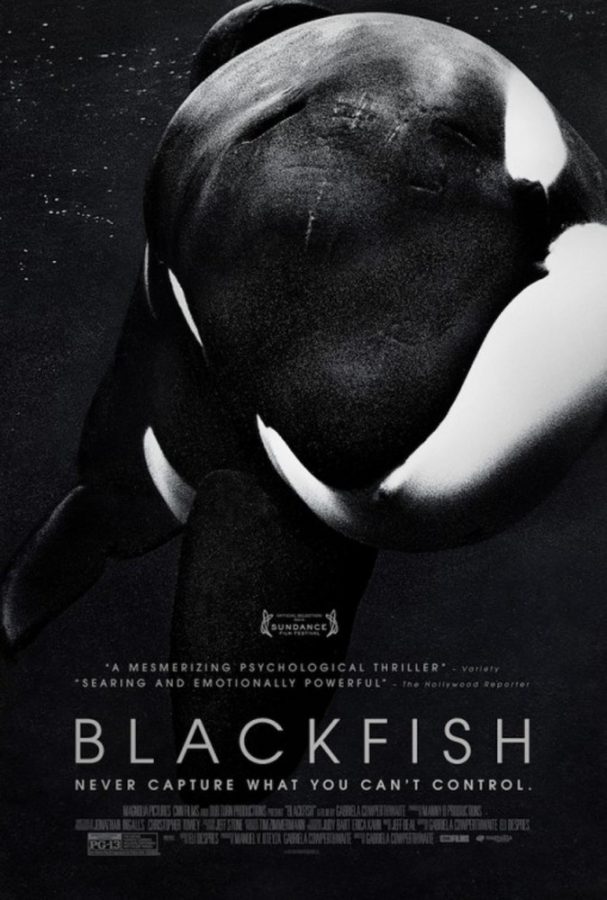When it was coined by fishermen decades ago, “blackfish” was a simple name to embody the regality of the massive creatures, which were regarded as special beings that were not to be disturbed. However, the term has taken on a negative connotation, and now represents the whales that have been taken out of their natural environment and held stagnant in captivity at SeaWorld and similar marine-life theme parks. A documentary titled after the archaic term, “Blackfish” is an engaging, and often harrowing, film, that might make you think twice about what life is actually like for Shamu, if you ever return to SeaWorld.
“Blackfish” is a documentary that revolves around the incident on Feb. 24, 2010 when the orca named Tilikum killed veteran SeaWorld Orlando trainer Dawn Brancheau. While it covers the specifics of what happened that day, the film has a much larger scope. Director Gabriela Cowperthwaite sets forth that the reason Tilikum and others of his species in captivity lash out is due to their captivity. The film addresses such things as the morally questionable business practices, the treatment of orcas by SeaWorld and the OSHA lawsuit against the park following Brancheau’s death. It is ultimately concerned with exploring the implications — to both animal and human — of taking a wild animal out of its natural habitat and confining it to an ill-fitted, artificial environment.
Tilikum is the main focus, and seeing his entire, wretched life story makes for the most compelling part of the documentary. He is not cast as a murderous villain, but rather as a victim of his environment. The movie is extremely unique, in that at least some part of it is a character study of an animal,albeit an extremely intelligent one. His path toward violence began at an early age, when he was kidnapped from his mother off the coast of Iceland and sent to Sealand of the Pacific, in Canada. There, two other whales consistently attacked him in captivity. The seeds continue to be sown, and seeing his life unfold on screen is equal parts heartbreaking and infuriating.
Numerous former SeaWorld trainers comprise many of the interviews, and their presence provides the film with so much of its ethos and gravity. In one of the first segments, the trainers describe their experiences while working with the killer whales at SeaWorld. Working with the orcas is the ultimate goal of being a SeaWorld trainer, and the trainers demonstrate an unabashed sincerity when they describe their elation and sense of purpose. Many, if not all, experienced one of the strongest connections of their lives with the whales. However, as the film moves along, their happy-go-lucky disposition gives way to disenchantment. Their beloved whales are tortured souls forced to perform circus theatrics. One trainer, with hesitation, even goes so far as to say that she doubts the emotional connection she feels with the animals is based on anything other than the fact that she feeds them.
The film also effectively undermines the fabricated happiness of the SeaWorld theme parks by juxtaposing their cheesy commercials with the horrors of whales in captivity. An exuberant young boy exclaims with glee that if you sit in the front rows during a Shamu show, “you’re a goner,” meaning you’ll get splashed. Ironically, this clip was preceded by accounts of orcas attacking humans and, in Tilikum’s case, killing them.
A sound argument, which all documentaries strive to make, must not only make a compelling case for the views that they are supporting, but must also address the opposition’s. “Blackfish” does not give as much screen time to the other side as it should. Though the evidence to support its claims is undeniable, only one person in the entire film claims that captivity has no negative effects on the killer whales. However, it should be noted that SeaWorld denied all interview requests.
“Blackfish” isn’t a film for whale people, or a film for those who solely like documentaries; this is a film for those who want to be informed citizens of their society. “Blackfish” is not perfect, but it is an important work of pragmatic filmmaking about issues that are presently occurring in our culture, issues that we’ve all had a very small influence in if we’ve ever visited SeaWorld.
Catch “Blackfish” at The Loft through Thursday.
—Follow him at Twitter.com/TDWildcatFilm









